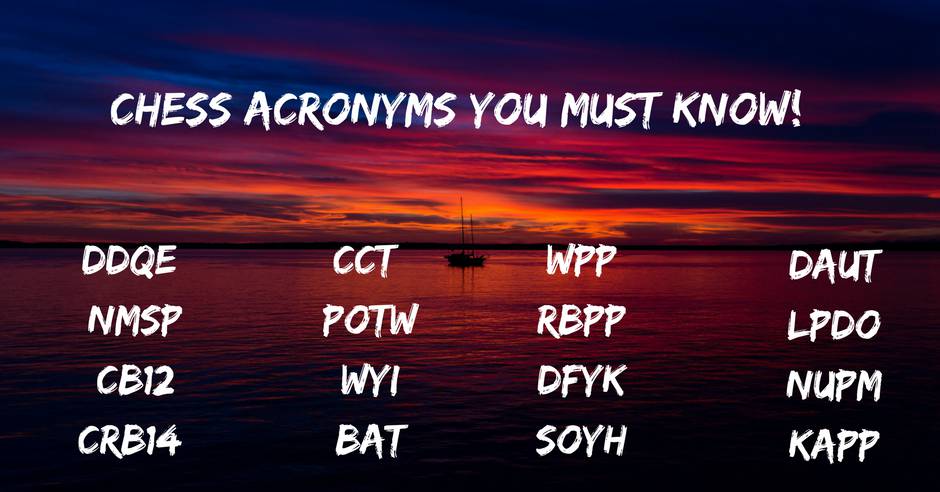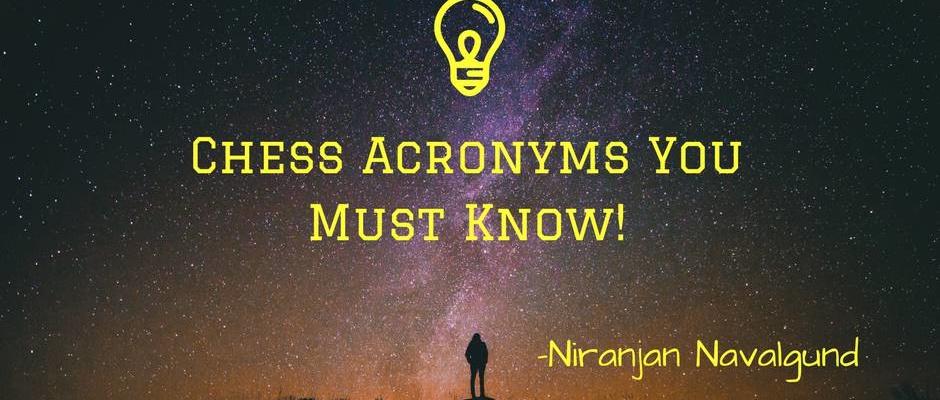Chess Acronyms You Must Know!
In the heat of the battle, there are SO MANY to go wrong. Mistakes are waiting to be made. Isn’t it? But, don’t worry. You will be happy after picking up the chess acronyms that can help you in keeping blunders at bay. Practice using these tools in your training games and tournament games regularly, so that they become a part of your routine chess thinking.
Opening:
DDQE: Don’t Develop Queen Early in the game as it gives tempo to your opponent. Queen is a powerful piece, but it is prone to attack by smaller pieces. Instead, focus on developing your pieces, castling and connecting your rooks.
NMSP: No Moving Same Piece in the opening. This is something that should be taught to every beginner as they tend to move the same piece twice in the opening, wasting a lot of time. Instead of moving the same piece, you could focus on bringing all the other pieces to the game.
CB12: Every rule has exceptions, but we could use this acronym in the beginning stage. CB12 stands for Castle before move 12. If you want your king to be safe, tuck your king to safety between 10 to twelve moves. If you can do it early, that’s good too. But, then there are exceptions leading to premature or early castling. So, watch out!
CRB14: Connect Rooks before move 14! This ensures that you complete development by the end of 14th move. If you manage to do this, you have passed the opening stage without any issues. Once the rooks are connected, you are ready to experience the transition to the middlegame.
Middlegame / Thinking:
CCT: This acronym was covered in Nisha Mohota’s Chessbase DVD: Strengthen your chess foundation. It stands for Checks, Captures & Transfers. You can make use of this tool and calculate the candidates moves using it. Check and Capture and self-explanatory and transfer refers to the changing position of pieces.
POTW: Whenever you have succeeded in spotting a weakness in your opponent’s camp, you must try to provoke a second weakness. This is a classical concept and one you must not forget! So, Remember – Principle of Two Weaknesses.
WYI: What’s your idea? This is a question you must carry with you on every move. As soon as your opponent makes a move, your thought antenna must grasp the question. This will help you in avoiding a lot of blunders as this improves your sense of danger – you start spotting your opponent’s ideas.
BAT: I read a few chapters of Aagards’s book ‘Attacking Manual’ and picked it from there. When you are attacking, it is important to Bring all toys to the attack. This increases your chances of launching a successful attack!
WPP: Worst placed piece is an important concept to improve your position. Consider improving your worst placed pieces in regular intervals, this could improve your overall game to a great extent.
Endgame:
RBPP: It doesn’t matter if you are on the attacking side or the defending side, all you must remember is that the rook belongs behind the passed pawn. There are many examples white manages to score extra half point just because the rook is behind the pawn even at the cost of some material. So, Rook behind passed pawn can fetch some points.
DFYK: Be aware of the transition from middlegame to endgame and start thinking of how best you can use your king. The king is an active piece in the endgame, use it. Don’t forget your king!
SOYH: Whenever you are trying to convert a winning advantage into a point, Sit on your hands! It is important to be patient and not get excited. Apply the Lasker’s rule – If you see a good move, look for a better one!
Time Trouble:
When you are in time trouble, a few acronyms coined by John Nunn will help you in making better decisions.
DAUT: Don’t analyze unnecessary tactics
LPDO: Loose pieces drop off! (Keep an eye on enemy’s unsupported pieces as they might fall prey to a tactic
NUPM: No unnecessary pawn moves
KAPP: Keep all pieces protected


